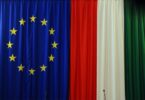Peter Akopov
At the EU summit in Brussels, “the most heated discussion in the past few years” took place. The two-hour discussion, “at times emotional,” was devoted to – no, there is no need to organize a summit with Putin in the near future, which Merkel and Macron proposed to hold.
They discussed the actions of “European Putin”, who has long been causing heartburn among European integrators. “You crossed the red line! This is not the Europe I want to live in!” – the Prime Minister of Luxembourg was indignant . “I intend to bring them to their knees. This time everything has gone too far! They have nothing more to do in the EU,” added the Prime Minister of the Netherlands . “Shame! Expel!” – all this was shouted to Hungarian Prime Minister Viktor Orban , demanding an explanation from him because of the recently adopted Hungarian law banning LGBT propaganda (including in schools and among minors). Leaders of 17 out of 27 countries signed an appeal to Orban calling for the law to be repealed – but the Hungarian prime minister stood his ground. Protecting families – that’s all.
And no one spoke in his defense (although the countries of Eastern Europe did not sign the appeal), there were only voices that one should not rush to make an exception. This is understandable: no one wants another blow to the EU, and Orban stubbornly stubbornly won’t knock him out. So Hungary will remain in the European Union, no matter how angry the progressive European integrators may be.
Having dealt with the opponents of homopropaganda, the leaders moved on to another issue on the agenda – about ordinary Putin. And then what was called a slap in the face and a defeat for Merkel happened – her proposal to organize an EU-Russia summit was failed. About a dozen countries opposed, and the main opponents were just East Europeans, Poles and Balts. Yesterday, late at night, the upset Chancellor announced that after “a very detailed and difficult discussion … today it was not possible to agree on an urgent meeting at the leadership level, that is, at the highest level … Personally, I would like some bolder step.”
Some agencies have translated Merkel’s words as “I personally hoped there would be more courage on this issue,” which looks especially ridiculous against the background of the previous agenda item. The woman, the de facto leader of Europe , expects courage from her male colleagues, who had previously spent two hours defending “real European values” from “Hungarian Putin,” expecting them to give the go-ahead to meet with Putin himself, whom every day called the enemy not only of LGBT people, but of the whole of Europe?
It is true, there is a paradox. Many of those who are against meeting with Putin are at the same time against LGBT propaganda (not as openly as Orban, not at the European court, but at home). And many of those who are for LGBT people are not at all against meeting with Putin – Merkel, Macron, Italian and Austrian authorities. There are, of course, consistent individuals like the Dutch Mark Rutte – he and Orbana (together with Hungary) are proposing to be expelled from the EU, and he is not going to meet with Putin. There is, if not courage, then at least some kind of consistency – not like the Poles.
Seriously speaking, the European Union not only lacks courage or unity – it lacks independence, responsibility and strategic thinking (do not even stutter in Brussels that earlier all this was considered mainly masculine qualities).
After all, what did Merkel offer?
Let’s take advantage of this opportunity (after the Russian-American meeting in Geneva ) and return to dialogue with Russia . We will not lift the sanctions, we will not abandon containment, but we will simply do the same as the senior Atlantic partner, the United States . Moreover, the EU and Russia have many common themes – so Macron says that European security is impossible without Russia. In this case, Merkel was not thinking about herself – yes, she would still have time to meet with Putin in the rank of chancellor, but that is not the point. She cares about the interests of Germany as she understands them. We just defended Nord Stream 2 , agreed on peace and friendship with Biden, difficult elections to the Bundestag are coming- it is necessary to leave at least some groundwork for the successors on the “eastern front”. And everything is in ruins there – why not resume the dialogue with Russia, after all, it really is in German interests? And in Europe – because the German elite no longer separates one from the other.
But a perfectly reasonable and profitable EU proposal, Merkel is drowning with the help of the most irresponsible and at the same time the most pro-American forces in Europe. That is, the Germans, French, and Italians are in favor of a dialogue with Moscow , while the Poles and Balts (with the support of a part of Northern Europe) are against. But which one is Europe? Poles – who cause almost the same heartburn among European integrators as Hungarians – because of the protection of their values ??and independence? Do the Balts have no independent role other than anti-Russian?
It is symbolic that the discussion at the EU summit took place against the background of the British provocation in Crimea – that is, everyone understands that, although Britain left the EU, the Anglo-Saxon clients still have the opportunity to influence the course of the European Union.
And the point here is not at all in European-Russian relations and not in the summit proposed by Merkel and Macron. Moscow has no illusions about its special benefits – as Sergei Lavrov quipped , “our colleagues need to explain what they mean and what they are striving for”:
“Just the other day, the European Union is approving a new policy towards the Russian Federation, which is formulated as a three-pronged policy:“ rebuff, containment and involvement where the EU is interested. ”If this philosophy underlies the initiative of the summit, then it is very interesting how such a hypothetical event will open and immediately should, therefore, follow “rebuff.” And then “containment.” How all this will be combined, I still find it difficult to say. “
So the point is not in the summit – which after all will take place anyway later, and on the initiative of the European Union itself, but in another proof of the weakness of the EU itself. This means that both France , and especially Germany, which too strongly tied their national interests with the common European ones, in fact, equated one with the other. It is clear that Berlin was counting on its power, on the ability to push through decisions, especially after the exit of Great Britain . And when Berlin and Paris are working together, who can resist? Only stubborn Orban?
But it turns out that the pro-American, pro-Anglo-Saxon faction in the EU will desperately resist the will of the Franco-German alliance. Thus depriving the European Union not even of masculinity, but of independence, freedom of action and strategic planning. That is, doing what Russia is accused of: ruining it.






